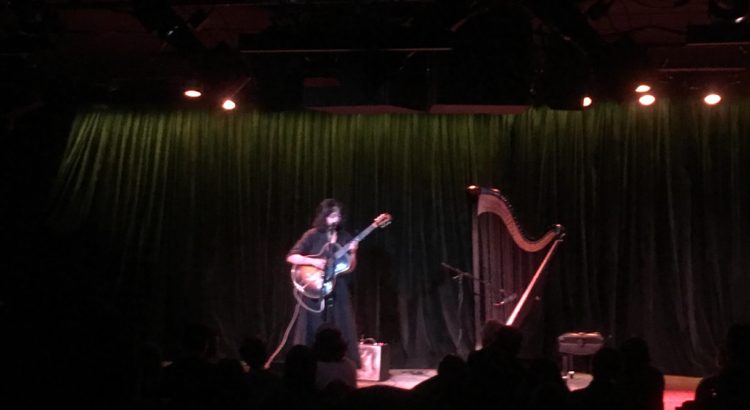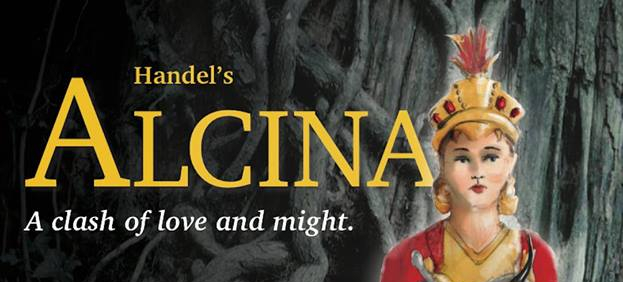The principal challenge of directing Baroque opera for a modern audience is, I think, the prevelance of the Da Capo aria. Da Capo arias are, in short, arias that take an ABA form. A main A section, followed by a contrasting B section, followed by a repeat of the A section, which some people feel should be ornamented with improvisations by the singer, and others feel should be sung exactly as notated. In a modern music theater mindset, we expect songs to get us from point A to point B, and the fact that so many arias in Baroque operas very specifically end with a return to the beginning seems counterintuitive to making them dramatically compelling. Of course, Handel in the 18th century wasn’t writing for a modern music theater mindset, and audiences in the 1700s approached operas very differently from how we approach them today. Meaning that sitting through contemporary productions of Baroque operas can be a real slog a lot of the time.
Alcina is one of George Frideric Handel’s more popular operas today, and when I heard that the University opera department was going to take a crack at it, my interest was immediately piqued, hopeful that the production would be able to thread the needle that is making Baroque opera compelling to a modern audience without compromising the elements that make it unique.
But first, a summary.
Alcina starts with Bradamante arriving at the island of the sorceress Alcina. She is disguised as her brother, Ricciardo, and has come to rescue her betrothed, Ruggiero, who has fallen under Alcina’s spell. Alcina is in the habit of seducing men who wash up on her island, and when she tires of them, transforming them into local wildlife a la Circe. Bradamante is accompanied the tutor, Melisso. The first person they meet on the island is Alcina’s sister, Morgana, who becomes infatuated with “Ricciardo,” which provokes the jealousy of Morgana’s suitor Oronte. Bradamante and Melisso succeed in finding Ruggiero, but he is so thoroughly under Alcina’s spell that he rebukes them. Meanwhile, a young boy called Oberto is on the island, searching for his missing father, whom Alcina has already transformed. In the rest of the plot, Bradamante and Melisso try to rescue Ruggiero from Alcina, while Morgana and Oronte work out their jealousy, and off on the side Oberto tries to get Alcina to show him his father.
And now, a review.

Right off the bat, this production was gorgeous. Gorgeous sets, gorgeous costumes, gorgeous lighting, even a pretty nifty-looking pre-show curtain. The look was very lush, but very stately, and reminded me of really old-school Jean-Pierre Ponnelle-style productions. It is a good look, a classic look, and one that works really well for this style of opera. I don’t think I can overstate how stunning the look of this production was, and the visual aspect was maybe of all aspects the most appealing.
The musical quality too was top-notch, as one would expect from the School of Music, Theater, and Dance. A phenomenal cast of singers (admittedly, I have only seen one of the two casts), and a wonderful orchestra lead by Stephanie Rhodes Russell. I did note that the orchestra was rather larger than Baroque opera typically calls for. Baroque opera often thrives with lighter voices which can sometimes get drowned out by a too-large orchestra, and it seemed that was sometimes the case here, but on the whole, the musical aspect of the production was excellent.
Unabridged, Alcina can run upwards of four hours. I estimate about an hour of material was cut from this production in an effort to get it down to a manageable length. Usually a three-act opera performed with two intermissions, this production had a single intermission inserted near the end of Act II, with the second half of the performance picking up with the last scene of Act II and going into Act III. It was a lopsided arrangement, with the first half of the evening being nearly twice as long as the second, which did make the first half somewhat fatiguing, especially as it had not only the length of two acts, but the dramatic content of two acts, which needs some time to be digested.
I had expected that the bulk of the abridgement would be in the form of cutting sections of Da Capo arias, and also trimming recitative, which turned out not to be the case. Oberto lost the largest chunk of his material (which had the side effect of making Alcina less villainous, as Oberto’s main function in the plot is to provide a victim for Alcina to antagonize so that the audience knows she’s evil), but I was surprised that as many Da Capo arias were kept entirely intact as there were.
The big problem with Da Capo arias (especially those as long as Handel writes) is how can you stage them such that by the end we feel something has actually happened? Does the aria progress the plot? Reveal something about character? Act as a signpost for an important turning point in the story? And what is the character’s reason for returning to the top of the aria? The very form makes this difficult, and I’m not going to try and be a purist and say all of Handel’s Da Capo arias are always one-hundred percent justified. Handel lived three-hundred years ago and these operas were written for a very different theatrical environment. I really think that, when presenting a baroque opera for a modern audience, there is no shame in trimming down a Da Capo aria if you can’t find a way to make it dramatically compelling.
So, yeah, a lot of the longer arias in this production were pretty stagnant, I might even go so far as to say boring. There was a lot of unmotivated standing and singing, or unmotivated wandering and singing. Sometimes it seemed that characters forgot to whom they were adressing an aria, or why they were even singing it in the first place.
Bradamante’s “jealousy” aria in the first act was one that stood out to me, because that’s one that I think very easily can be incredibly compelling, and reveal something about Bradamante’s character, but here it just wasn’t and didn’t. But most of the arias that I found stagnant were ones that I recognize are difficult to pull off theatrically, so mostly I just wished they had been trimmed down.
On the other hand, there were also arias that really really worked! Oronte and Morgana were the two most engaging characters, probably in no small part because their subplot is arguably more interesting than the main plot with Alcina and Ruggiero. Oronte is a character that I have never really liked, but in this production he was maybe the biggest highlight, and, in a novelty to me, managed to be really funny and shockingly entertaining without compromising the overall serious tone of the opera.
The interpretation of Morgana in this production was also new and interesting to me. I’ve seen her played very innocently, almost childishly sometimes, and, most notably, I have seen her played (and have typically interpreted her myself) as being as much a victim of Alcina as anyone else in the opera. (Which is why I’ve always felt that Morgana getting vanquished along with Alcina at the end is really unwarranted and unfair.) In this production, she was definitely still a more likeable and more fun-loving counterpart to Alcina, but she was also very clearly conscious of her own actions and had agency — she even carried around a sword in the first act, and used it! So this production loaded her with a bit more responsibility for her own actions, which at the same time lessened the villainous aspect of Alcina much in the same way reducing Oberto’s part did, since Alcina didn’t really seem to be excersizing any control over Morgana here.
All this considered, I still found Morgana the most likeable character in the opera, and I still feel her being vanquished at the end is undeserved. And I think it’s great that, between Morgana and Oronte, this production really managed to maintain two complex and morally ambiguous characters who were both still really likeable and fun to watch on stage, again without compromising the overall tone of the opera.
I don’t mean to diminish the other players. Bradamante, Ruggiero, Melisso, Oberto, and, of course, Alcina, as important pieces of this opera, and, considering the difficulties of Baroque opera previously mentioned, were about as well executed here as I’ve ever seen them. It was with Morgana and Oronte, though, that this production really went above and beyond, and I wish that Handel and Riccardo Broschi (the librettist), had given them the ending they deserve. I have said in the past that this opera does not deserve Morgana, and that Morgana deserves a better opera. This production confirms that for me, and adds Oronte to the list as well.







